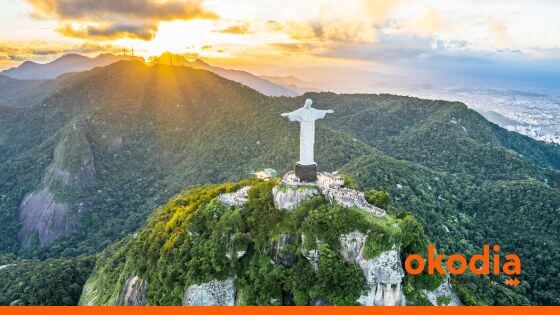Brazil is a unique country known for its history and cultural diversity. It is also the largest country in South America, in terms of both size and population. And on the subject of population… the population of Brazil, with more than 214 million inhabitants, make this a fantastic place in linguistic and cultural terms. Why is that? Because Brazil is a country whose historical events have left such a big mark that they have turned it into a linguistic melting pot. Read on to find out, with our translation company in the UK, the fusion of cultures and languages of Brazil, this incredible country full of linguistic diversity.
Exploring the diversity of languages in Brazil
If you ask yourself what the language for Brazil is, you will be amazed by the answer. Brazil is home to no fewer than 238 different languages. To give you an idea of this, Brazil languages range from the official language, Portuguese, to indigenous languages such as Ticuna and to foreign languages such as Spanish and even Japanese. Brazil is a true linguistic treasure trove.
To make this topic easier to understand we are going to explain it by dividing the linguistic history of Brazil into two different periods: Brazil prior to the Portuguese colonisation and Brazil after the colonisation.
Languages in Brazil before the Portuguese arrived
Before the European colonisation and the consequent imposition of Portuguese, this country was inhabited by indigenous tribes. Some parts of the Amazon jungle are still inhabited by these tribes and therefore many of these languages have survived over the years.
Brazil is home to many indigenous languages, an estimated 217 in total. Ticuna, nheengatu, kaingang and guarani are just a few of the hundreds of indigenous languages still spoken in Brazil and that have left a unique linguistic legacy. Although not many people speak them (only around 40,000 people have the privilege of communicating in these languages), they are true cultural gems.
Languages in Brazil after the Portuguese arrived
With the arrival in Brazil of the Portuguese, the linguistic panorama of the country began to change. Portuguese became the national language but over time, other languages became dominant aside from portuguese, especially European languages:
Portuguese
After the arrival of the Portuguese in 1500, Portuguese became the main language and it has left an indelible mark on Brazil’s culture and identity. Portuguese is currently the main language. It is the official language of Brazil and the first language of an impressive 97.9% of the Brazilian population.
However, Brazilian Portuguese has evolved and has become a version that is unique around the world. It has even surpassed the Portuguese spoken in Portugal to establish itself (Brazilian Portuguese or Brazil language), as the standard version around the world. Isn’t life strange!
Differences between Portuguese from Portugal and Portuguese from Brazil
While people speaking Portuguese from Brazil and those speaking Portuguese from Portugal can understand each other, there are some differences between the two languages. These are due, among other things, to the traces that indigenous languages and amerindian languages still leave behind, meaning that the Portuguese language in Brazil has undergone many transformations. This means that its pronunciation, vocabulary and even the meanings of words have moved a long way from the Portuguese spoken in Portugal.
- The creativity of the Brazilians is amazing when it comes to speaking. People in Brazil have turned some multi-word expressions into a single word. For example, the Portuguese expression “dar os parabéns”, which is used to congratulate someone, is combined by Brazilians into a single word “parabenizar”.
- European and Brazilian versions of Portuguese have different words for the same thing. For example, in Brazil the national identity document is called “cédula de identidade”, while Portuguese speakers say “bilhete de identidade”.
- Another key difference is the word “you”, which in Portugal is “tu” but in Brazil is “você”. Although “você” exists in Portugal, it is simply a formal way of addressing someone, like “usted” in Spanish.
- In terms of pronunciation, Brazilians accentuate the vowels when they speak and tend to do so with a more open mouth, unlike the way people in Portugal speak. The pronunciation of some consonants differs as well, especially the sound “-s” at the end of words. In Brazilian Portuguese, this is pronounced as /ss/, but in European Portuguese it is pronounced as /sh/. For example, the word “português”, in Brazilian language, is pronounced as it is written, but in Portugal it is more of an /sh/ sound.
German
While only representing 1.9% of the population, German speakers have left a lasting mark on the country. At the end of the 19th century and in the 20th century, especially in the 1940s, they emigrated to Brazil as a result of social upheaval back home, and they brought their language with them. Since then, German has flourished and is the second most widely spoken language today. It is still spoken by many people and is taught in schools in some communities across the country.
Italian
Italian has a place in Brazil today and is one of the most spoken languages, also due to the arrival of Italian immigrants in the 19th and 20th centuries. During that period Italy was experiencing difficulties, such as a shortage of land and overpopulation, which drove many Italians to seek new opportunities in Brazil. For its part, the Brazilian government promoted European immigration to boost the country’s development, especially the agricultural sector. That’s why, today, there are Brazilians who speak Italian as their first language.
Spanish
Since it is surrounded by so many Spanish-speaking countries, it is no surprise that many Brazilians have embraced Spanish as a second language. And they speak it so well! When travelling to Hispanic countries, Brazilians amaze people with their fluent Spanish language, creating connections that cross borders. In addition, in the areas of Brazil that border with Spanish-speaking countries you can find a pidgin language known as portuñol.
English
English also has an important role in Brazil. From the classroom in São Paulo to the streets, English has become an essential part of the lives of Brazilians. From an early age, pupils are immersed in this universal language, and fluency in English is common among young Brazilians. English has even taken over the role of the second most learned language, surpassing Spanish.
Japanese
At the beginning of the 20th century, a large number of Japanese people also came to Brazil in search of new opportunities. This was driven by agreements between the governments of the two countries to combat poverty and overpopulation. To this day, Japanese continues to be heard, having been passed down from generation to generation. In addition, Japanese has acquired special importance in the economy of Brazil and in the business world, since Brazil and Japan maintain close commercial ties.
Let’s celebrate the diversity of languages
Brazil is a land where the primary language is Brazilian Portuguese, but this coexists with a wide range of other indigenous and immigrant languages. So, it’s time to promote the power and beauty of Brazil’s linguistic diversity! Each of its spoken languages contains a little bit of history and an identity that deserves to be valued and preserved.
At our translation agency in London we are well aware of this, so if you need documents to be translated into any of the languages found in this country to promote linguistic diversity, we would be delighted to do it. Why wait to promote the linguistic diversity of Brazil?













